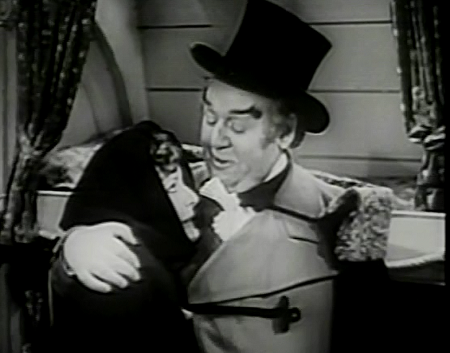
**Warning: Some spoilers (though I don’t reveal the mastermind in the novel; Hitchcock alters the story enough for it still to be a mystery).
I just finished watching Breaking Bad, and was struck by the thematic similarities between it and Jamaica Inn, one of my favorite novels as a teen. Both involve major characters refusing to own the horrific nature of what they’ve set in motion, both include a slow-burning menace that frequently breaks into sudden violence, and both demonstrate the moral costs of greed–and the many innocent victims left in its wake.
While Walter White is the leader of a meth empire, the villain of Jamaica Inn is the mastermind behind a group of wreckers, who lure ships with false lights and then kill everyone aboard to get the loot without hanging for their crimes. While Joss, the rough-talking inn owner, initially seems to be the head of the operation, we soon learn that there’s a much colder and smarter man working above him.
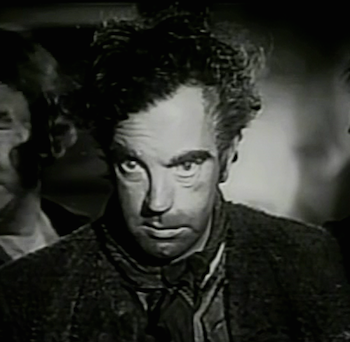
Joss (Leslie Banks)
And though Joss has sympathetic qualities and weaknesses, the mastermind–whose identity we don’t learn until late in the story–cares for no one. Joss is terrified of him.
The heroine of the story is Mary (Maureen O’Hara in the film), who comes to Jamaica Inn completely unaware of the criminality of its keeper, her uncle.
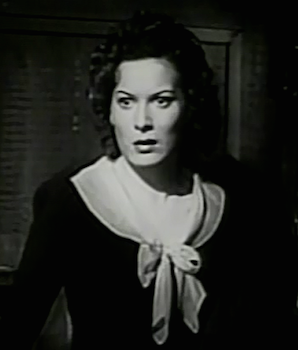
She soon discovers that something is off. The coachman doesn’t want to drop her off there. The inn doesn’t have any inhabitants besides the owners. The bar is full of shady characters.
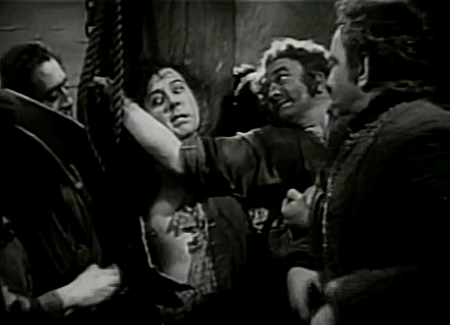
Bar inhabitants
There are odd noises at night. And then there’s her uncle’s warning: “There’ll be nights sometimes when you’ll hear wheels on the road…and those wheels will not pass on, but they’ll stop outside Jamaica Inn. And you’ll hear footsteps in the yard, and voices beneath your window. When that happens, you’ll stay in your bed, Mary Yellan, and cover your head with the blankets. Do you understand?”
Our fear as readers is slowly discovering what is going on. That mixture of unease and hope that things will improve keeps us engaged. And yet in the film adaptation, the director cuts that fear instantly by starting with the wreckers destroying a ship. Who, you ask, would make such a critical error? Ummm. Hitchcock?
Two of Alfred Hitchcock’s best known films–Rebecca and The Birds–originated in the writing of Daphne Du Maurier. In both cases, he displayed a sharp understanding of her intent, carefully reproducing the psychology of the narrator in the former and quietly building on the creepiness of the birds in the latter. That’s why his failure with Jamaica Inn (1939) is so baffling. The book is brilliant, the movie mediocre. The master of suspense completely botches the book’s beautifully crafted, slow-burning sense of menace with his timeline. He gives away Jamaica Inn’s mystery in the first scene. He reveals the mastermind (whose identity is uncovered late in the novel, when Mary mistakenly runs to him for help) within the first twenty-five minutes. As a result, I found the movie full of some nicely done set pieces, but very little suspense.
Similarly, Hitchcock just doesn’t get the characters. Jamaica Inn is terrifying because the characters feel powerless. Patience (Marie Ney) may love her husband, Joss (Leslie Banks), but it’s her fear that keeps her submissive to him–her fear of his violence toward her, of the violence he inflicts on others, and worst of all, of her moral corruption in enabling him.
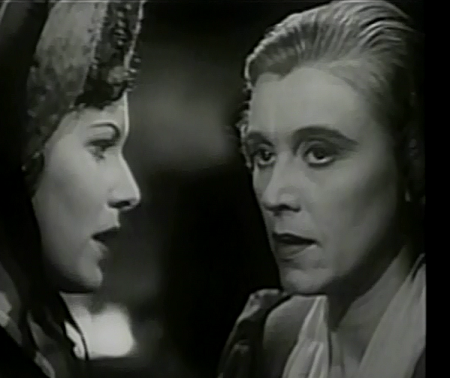
Patience (Marie Ney)
She has become a flitting, barely there woman, purposely dwelling in a fantasy world to avoid facing what he and she have become. She can’t leave him because she’s been beaten down by psychological abuse. Mary (Maureen O’Hara) is terrified for her, must stay with her, because Patience’s utterly unable to act for herself. Basically, Patience is Season 5’s Skyler White without the will or resilience. The stand-by-her-man character Hitchcock has given her instead makes no sense (though Skyler White haters might have approved).
Even odder is the characterization of Mary. In the novel, she’s independent, sassy, and quick tempered, particularly when it comes to male arrogance and unwelcome handling. Yet there she is in the film, letting Sir Humphrey (Charles Laughton) paw her as he did his horse. She smiles; she claims he’s a gentleman. WHAT? Mary is no fan of the upper classes in the novel, nor is she easily charmed or manipulated.
Her enforced trip with the wreckers is terrifying in the book because she keeps witnessing–and is unable to prevent–the murders that enfold in front of her. What we witness in the novel is the annihilation of what was left of her innocence, and we feel how we do when we watch Breaking Bad‘s Jesse’s wrenching reactions to a child’s death. Yet in the movie version of Jamaica Inn, there Mary is, conveniently preventing the wreck, as if one woman could accomplish that when surrounded by men trying to force themselves on her. This is the work of a cheap action director, not a Hitchcock.
Clearly, the director got carried away by his desire to let Charles Laughton, a minor character in the book, dominate the film.
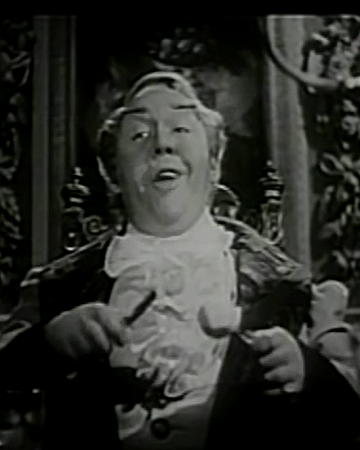
The eyebrows alone are unforgivable
Laughton also co-produced, so his elevation isn’t surprising. Because he is Laughton, mugging and having a field day with the material, the movie contains a number of funny moments, and a picturesque conclusion. Much can be forgiven, of course, since the film debuted O’Hara, gave us striking action scenes, and included understated humor (via the servants of Sir Humphrey). But so much is missed by turning this film into camp: that suspicion Mary feels when she hears but never sees a man alone in a room in the inn (the mastermind), or finds the rope hanging from a beam but can’t be certain it implies a hanging.
What a film it would have been with just a few glimpses into Patience’s fear, or her equally frightening resignation: “…if you came to guess but half of what I know, your hair would go grey, Mary, as mine has done, and you would tremble in your speech and weep by night, and all that lovely careless youth of yours would die, Mary, as mine has died.” Or for one scene like Mary’s eerie walk into her uncle’s house after an absence, when she sees the collapsed clock, hears the silence, and senses what’s happened. A fragment of fear, a suspicion, is so much more sinister than outright knowledge. Hitchcock knew this. As a New York Times reviewer wisely put it, “Having set his own standards, Alfred Hitchcock must be judged by them….” And by Hitchcock standards, Jamaica Inn is a failure. Too bad he chose such an excellent book to butcher. I see that just a few years ago, a miniseries attempted the story. I’m sure it’s better. But wouldn’t you like to see what Vince Gilligan could do with it?
This post is part of the Beyond the Covers blogathon, hosted by Speakeasy and Now Voyaging. Check out the wonderful entries here.

You’re right about the lack of suspense. I’ve always been kind of “meh” about this film, and you’ve articulated why. Even without reading the book (must add it to my List), the film does fall flat.
I’m also going to give the film another go, now that I’ve read your excellent post.
Thank you! It is fun to watch Charles Laughton just enjoying himself. You get the feeling he just saw that there were ships and drama and a bad guy, and figured it was his chance to just play a really weird character. As long as you go in knowing that’s what you’re getting out of it, it’s easier to enjoy. But the book really does have Du Maurier’s wonderful sense of suspense and such a great development of mood. It’s not surprising so many of her stories made it into film; what’s amazing is how many of those films DID a great job translating her stories. My Cousin Rachel and Frenchman’s Creek are both well done (as well as the Hitchcocks). I haven’t seen Don’t Look Now yet.
I read about this film in Maureen O’Hara’s autobiography so I am intrigued…and your post has increased that! Thank you so much for joining us!
Thank you! It’s an odd one, but worth checking out:)